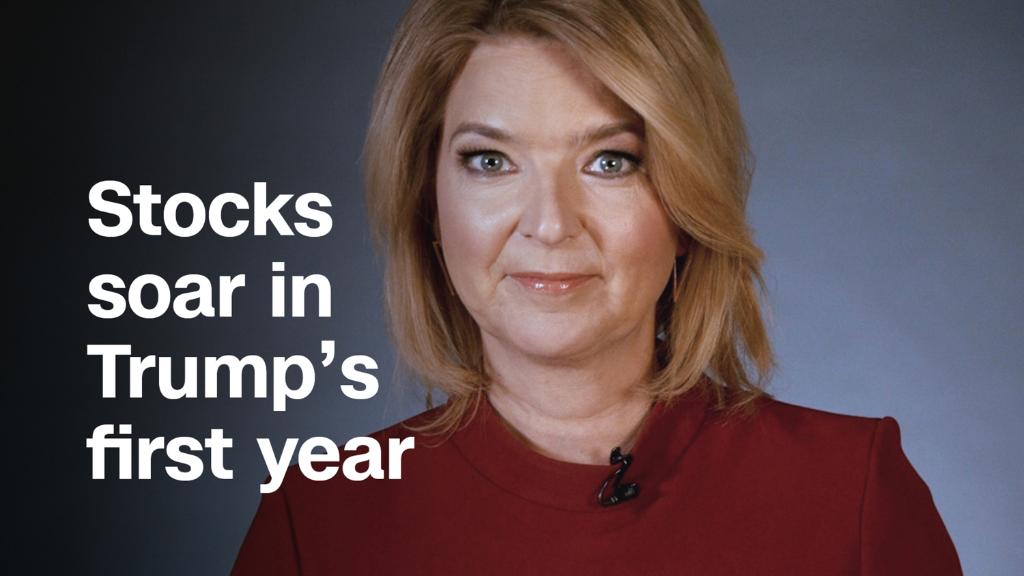
1. What's in store: By all measures, 2017 was a stellar year for the stock market. As we enter a new year, experts are cautiously optimistic that stocks will continue their hot streak in 2018.
Stocks soared last year on huge corporate profits and economic growth. The Dow Jones industrial average shot up by 25%, the S&P 500 grew by 19% and the tech-heavy Nasdaq index outshined them both with a 28% gain.
The rally was also fueled by the promise of the sweeping tax cuts by the Republican-led Congress and President Trump. Over time, those cuts will save corporate America billions.
In 2018, that means corporate earnings will continue to grow. Higher profits should boost the S&P 500 in the new year, said John Lynch, Chief Investment Strategist for LPL Financial.
A strong economy also helped lift stocks this year. Analysts expect the economy to continue growing, albeit at a slower pace than last year.
Wells Fargo (WFC) forecasts the U.S. economy will grow by an average of 2.5% each quarter next year and the year after. That would put the economy on track for its longest expansion in decades -- but it would also be one of its weakest expansions since World War II.
A weak expansion isn't necessarily a bad thing, they said: It may be why the market has been rising virtually unabated since 2009.
Related: It was an epic year for stocks
And consumers are heading into the new year confident. American shoppers were likely responding to 2017's great job market and the stock market rally.
"Consumers' expectations remain at historically strong levels, suggesting economic growth will continue well into 2018," Lynn Franco, director of economic indicators at the Conference Board, said in a statement.
Investors don't want to miss out on the market's streak, and they are most confident that the tech, health care and industrial sectors will outperform their peers, according to a survey conducted by research and investment management group Natixis.
But next year's growth could be considerably bumpier than this year's. Investors surveyed by Natixis said they think low interest rates have led to bubbles. They worry that geopolitical unrest could increase market volatility.
That's not saying much: Market volatility was at a historic low this year, and the market's rise had few hiccups. That's unusual -- typically bull markets encounter a few major dips and dives along the way.
Globally, some economies may have a rosier 2018 than others. Analysts think Argentina and Nigeria are poised for more growth, while Turkey may have peaked.
Related: U.S. stocks had a banner year in 2017. These markets did even better
2. Minimum wage workers get a raise: The minimum wage is set to rise for workers in 18 states and about 20 cities and counties on Sunday and Monday.
The increases will give $5 billion to 4.5 million workers over the course of the year, according to the left-leaning research group Economic Policy Institute. It's likely that most of that money will be spent rather than saved, said David Cooper, a senior economic analyst with EPI.
Related: Here's where the minimum wage is going up in 2018
American consumers spend trillions each year, so that figure isn't nearly enough to jolt the U.S. economy, Cooper pointed out. But it could make a difference in smaller communities where earners get a large enough raise. In areas where consumer spending is depressed, Cooper said, "the injection of additional funds to low wage workers can have a modest stimulative effect."
Big retailers like Walmart (WMT) and Target (TGT) have already raised their employees' wages -- so they only stand to gain from the changes.
3. Pharmacies report earnings: Rite Aid (RAD) is set to report earnings on Wednesday, and Walgreens Boots Alliance (WBA) on Thursday.
Pharmacies are going to have to step it up to succeed in 2018. If the acquisition of Aetna (AET) by CVS (CVS) is approved, the companies say it could transform drug stores into health clinics and lower prices for consumers.
Related: What the CVS-Aetna deal means for consumers
Pharmacies may also have to contend with Amazon (AMZN). Rumors of the company's entry into the prescription drug distribution have been swirling, and may have even been a factor in CVS's decision to acquire Aetna. Shareholders will have a chance next week to ask Rite Aid and Walgreens how they plan to stay competitive this year.
4. December jobs report: The Bureau of Labor Statistics is scheduled to release December's jobs report on Friday.
Employers added 228,000 jobs in November, and the unemployment rate remained at a 17-year low of 4.1%. The November report also revealed that average weekly paychecks increased by 3.1% over the previous 12 months. That was the first time paychecks grew by more than 3% in nearly seven years.
Related: U.S. consumer confidence remains near 17-year high
5. Coming this week:
Monday -- Minimum wage increases go into effect.
Wednesday -- Rite Aid earnings
Thursday -- Walgreens and Monsanto (MON) earnings
Friday -- Jobs report


